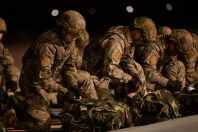Source: Observer Network
[Text/Observer Liu Chenghui] Several days after the Russian naval fleet arrived in Cuba this week, a nuclear submarine of the United States Navy and a Canadian patrol ship also arrived in Cuba on June 14 local time. Although both the United States and Canada claimed that the action had nothing to do with Russia, Reuters reported that the gathering of U.S., Russian and Canadian warships in Cuba reminded people of the cold war situation and the current tense relations between Russia and the West on Ukraine.
 On June 14, when the Canadian patrol ship arrived at Havana port, it passed the Russian naval nuclear submarine in the port. Reuters
On June 14, when the Canadian patrol ship arrived at Havana port, it passed the Russian naval nuclear submarine in the port. Reuters The Russian Ministry of Defense previously said that the frigate "Admiral Gorshkov" and the "Yasen" class nuclear submarine "Kazan", after conducting "high-precision missile weapons" training in the Atlantic Ocean, had sailed into Havana Port, Cuba on the 12th and were expected to stay until the 17th.
Earlier on the 14th, the Canadian Navy patrol ship "Margaret Brook" sailed into Havana Port. A Canadian foreign ministry official said that this was a "routine port visit", which was part of Canada's long-term cooperation with Cuba and "had nothing to do with the existence of Russian ships".
Just a few hours ago, the US Southern Command announced that the US Navy's "Helena" attack type nuclear submarine had arrived at Guantanamo Bay Naval Base for a "routine port visit", which was "planned in advance".
 US Navy Los Angeles class attack nuclear submarine "Helena" (US Navy data picture)
US Navy Los Angeles class attack nuclear submarine "Helena" (US Navy data picture) The Cuban Foreign Ministry said that they had learned about the arrival of American submarines in Cuba, but were not happy about it.
Carlos Fernandez de Corsio, Vice Minister of Foreign Affairs of Cuba, said: "The Navy usually needs to be invited to visit a country, but this is not the case." He said: "Obviously, we do not like a country that is officially and actually hostile to Cuba, and sends submarines to our territory."
 On June 12, 2024, the Russian warships that visited Cuba sailed into Havana Port, where people gathered to take photos and welcome the Russian troops. (IC Photo)
On June 12, 2024, the Russian warships that visited Cuba sailed into Havana Port, where people gathered to take photos and welcome the Russian troops. (IC Photo) On June 12 local time, the Russian naval fleet arrived at Havana Port, Cuba. When the fleet entered the port, the Russian naval fleet and the Cuban Revolutionary Armed Forces fired 21 salutes to each other, and the Honorary Orchestra of the Cuban Revolutionary Armed Forces also appeared at the welcoming ceremony.
The Ministry of the Cuban Revolutionary Armed Forces announced on the 6th that the visit of the Russian fleet to Cuba is in line with the historical friendly relations between the two countries and strictly abides by relevant international regulations. All ships do not carry nuclear weapons, and the stay in Cuba will not pose a threat to the region. During the visit to Cuba, the Russian navy will visit the commander of the Cuban revolutionary navy and the governor of Havana province, and visit local historical and cultural sites.
On the eve of their arrival in Cuba, Russian naval vessels once appeared "less than 30 nautical miles" away from the waters off Florida, the United States. For this reason, the United States sent out "Aliburke" class destroyers, P-8 anti submarine patrol aircraft and Coast Guard "Legend" class patrol ships and other ships and aircraft for "close surveillance".
When asked what message the navy ship sent during its visit to Cuba, Russian Foreign Ministry spokeswoman Maria Zaharova said on the 13th that the West never seemed to notice the signal sent by Russia through diplomatic channels.
"When it comes to military exercises or sea navigation, we will immediately hear questions and hope to understand what these information means." She said, "Why can only signals related to our army or navy be transmitted to the West?"
Editor in charge: Chen Jianrui SN243





















